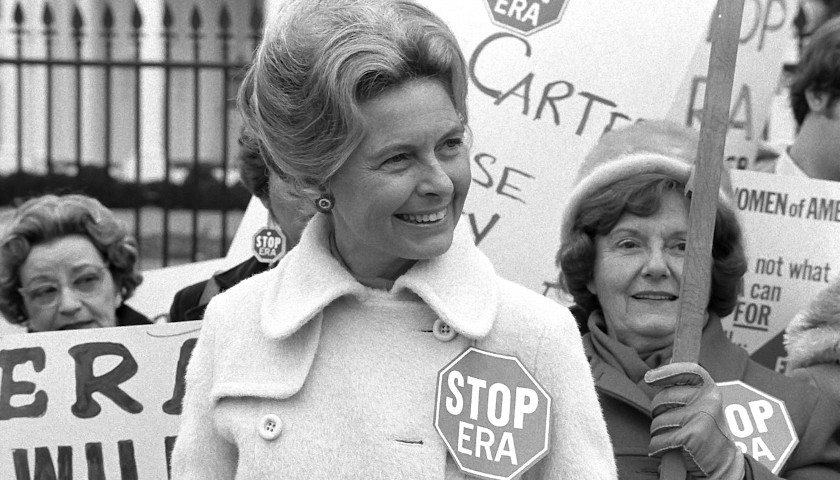by Michael Leaser
Amy Sherman-Palladino’s writing is full of witty, sharp dialogue that makes you need to rewind a couple times every episode to make sure you caught exactly what was being said. Usually, it’s brilliant.
In her Emmy-winning Amazon series, “The Marvelous Mrs. Maisel,” Sherman-Palladino has created two dynamic female characters: polished upper West Side housewife Midge Maisel and her wise-cracking street smart manager Susie Myerson.
Sherman-Palladino is responsible for many strong, empowered female characters, such as those in the “Gilmore Girls.” So it’s a bit jarring to see her new show slander one of the strongest, most influential women of the 20th century in the penultimate episode of Season 3.
Younger viewers may not be familiar with Phyllis Schlafly, so they will likely come away from the episode thinking she was, as Sherman-Palladino describes her: a “monster.”
So who was this “monster”? Born in 1924, Phyllis Schlafly not only lived through, but experienced the Great Depression. Then in 1952, at a time when most women were largely expected to be good housewives like Mrs. Maisel, Schlafly ran for Congress as a Republican. Though she lost that contest, she continued to exert influence in the party, promoting a strong anti-Communist line and chastising Nixon in 1960 for bowing to liberal Republicans like Nelson Rockefeller, whom she accused of corruption and putting international interests above American interests.
It is in this context that Miriam “Midge” Maisel, doing voiceover work in New York, is starting to practice a live radio ad for Schlafly when her father Abe comes into the room and “educates” Mrs. Maisel about Schlafly.
Abe: “She is a right-wing nut job. She’s come out against Nixon.”
Midge: “Right. We don’t like Nixon.”
Abe: “Because she thinks he’s too left wing.”
Midge: “That doesn’t sound real.”
Abe: “She also said Eisenhower only got in office because of secret kingmakers in New York. I’m not sure if you know what ethnicity she’s referring to with the words ‘kingmakers’ and ‘New York…’”
Abe then proceeds to make a crude reference to the obvious – to him – conclusion that she’s referring to Jews. The only problem with that statement is that Schlafly herself identified liberal Republican WASPs like Rockefeller as those despised kingmakers.
When Midge makes it to the studio and gets into the sound booth, she decides a minute before air that she cannot read the ad.
Midge to her manager, Susie: “This woman, this Schlafly woman, she’s awful. I stopped by the library. I looked her up. She is racist and sexist, and she uses way too much hairspray. I don’t want to speak for her.”
Susie: “Miriam, you just recorded a spot for a massage parlor in Newark. Do you know how many greasy hand jobs happen on a daily basis at a massage parlor in Newark?”
Midge: “This is on a whole different scale. This is a giant greasy hand job.”
Then the voice actor playing the husband starts reading the ad.
Husband: “America, the land of promise. Honey, do you ever think about the kind of world you want our kids to inherit?”
Susie jumps in and starts reading the ad.
Susie: “It’s all I can think about when I look into their sweet innocent faces and their big blue eyes.”
Husband: “But there’s so many forces working to usurp us.”
Susie: “I know, dear, like foreigners and Communists who don’t even think we should fly the American flag outside our little house.”
Husband: “There’s nothing wrong with taking pride in the Stars and Stripes. Here, lean in, honey.”
Susie: “Oh, I love it when you rub my nose.”
Husband: “And there’s nothing wrong with taking pride in our country’s might.”
Susie: “I was just explaining to little Timmy this morning that the atomic bomb is a marvelous gift that was given to our country by God.” She then breaks character, swearing and uttering, “This woman’s a monster!”
Husband continues: “Did you also tell the children that we can’t let certain well-financed minorities determine America’s future?”
Another woman in the studio rushes in to finish the ad. She skims through the script but obviously can’t find the line, so she makes this up: “Yes, my dear, I told them to brush their teeth and not let certain well-financed minorities have futures.”
After the ad ends, the woman looks up and says, “This woman’s a monster.”
Ignoring the vulgar comparison of the Schlafly ad with a massage parlor ad, there is no record that Schlafly used the phrase “well-financed minorities,” and even if she did it was likely in the context of those liberal WASP kingmakers.
The larger question is why did Palladino and her husband Daniel, although members of the Hollywood left, feel the need to write this political character assassination when they have avoided anything of this scale in their shows before?
The answer likely lies in what Schlafly did after 1960. She was instrumental in defeating the proposed Equal Rights Amendment to the Constitution in the 1970s. Schlafly contended that the amendment could lead to the elimination of special rights for women, such as alimony for abandoned housewives, exemption from the draft, and the tendency for courts to favor mothers in child custody cases.
The more recent transgression, and likely the one to draw the Palladinos’ ire, was Schlafly’s final book, “The Conservative Case for Trump.”
For the Hollywood left, figures like Schlafly must be mischaracterized, mocked, and diminished. They’re hoping that where they lead, their audience will follow. If it requires fabricating details about a deceased political figure they disagree with, well, we shouldn’t be surprised.
– – –
Michael Leaser is an editorial associate at The Charlemagne Institute. As vice president of Cave Pictures, he produced the films Wildflower, The Ticket (starring Dan Stevens), and Martin Scorsese’s adaptation of Silence. He has written 50 film and culture articles for World magazine.





